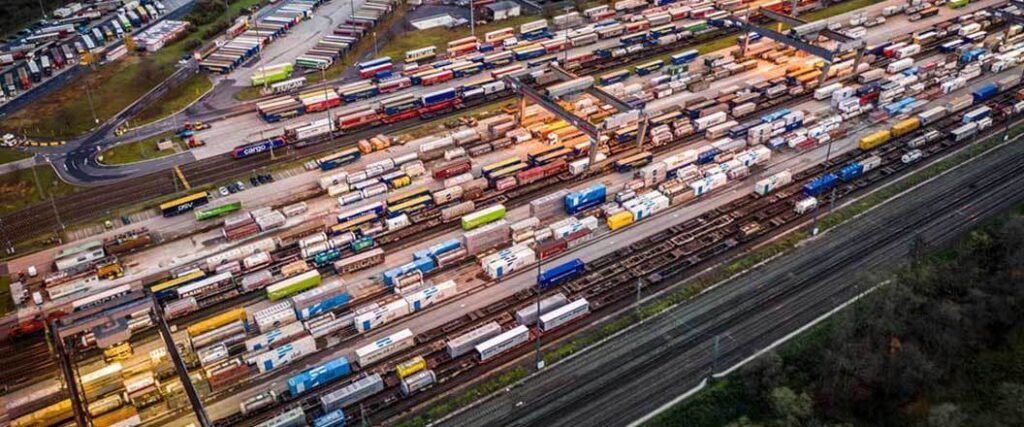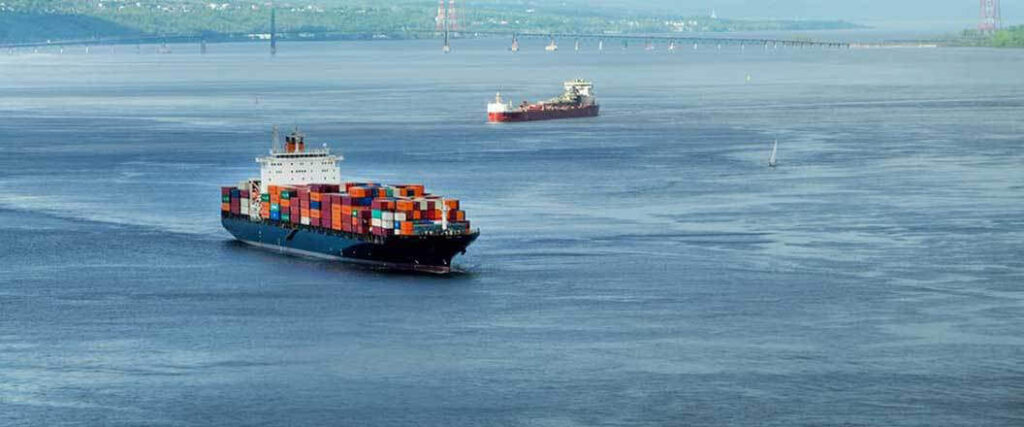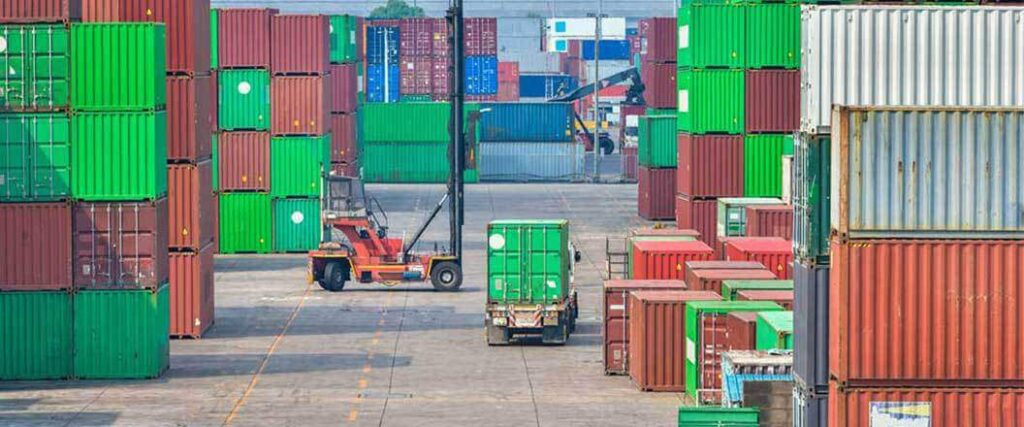“What is cargo insurance coverage?” is a question that many shippers of domestic and international freight ask themselves. Transporting freight can be a risky endeavor to undertake, regardless of how far your freight travels. As a shipper, it’s important that you understand what insurance coverage is and how it can help you.
There are many varieties of cargo insurance coverage to choose from. Cargo insurance covers things like natural disasters, theft, and improper handling of your goods. Having cargo insurance will also give you more protection than what’s afforded to you by carrier liability.
We’ve got the complete rundown on cargo insurance so you know what to expect when you get this form of coverage.

Cargo insurance is not required for domestic shipping, but is highly recommended. Even when carriers are transporting goods in the domestic U.S., plenty of scenarios can lead to your goods being lost or damaged. Some of these scenarios include:
These scenarios are more likely to occur the further away your freight has to travel. Freight that’s shipped over long distances often has to travel through more areas with varying weather and traffic conditions. Your freight will also pass through multiple terminals on its way to the final destination. All of these factors can present scenarios where your freight can sustain damage.
Like with domestic shipping, you’re not required to have insurance to ship freight internationally either. That said, it’s also highly recommended that you obtain insurance for your shipment. There are even more factors at play that can cause loss or damage to your goods when shipping internationally as opposed to domestically.
Without cargo insurance coverage, you’re left with only carrier liability to protect your shipment. This might seem like a good alternative, but there are many situations where carrier liability won’t protect you, such as:
Below, we’ve included some alarming statistics that show why you should obtain cargo insurance coverage.
| Amount of e-commerce returns due to damage | 20 percent |
| Cargo Ship Losses from 2011 - 2021 | 357 |
| Amount of shipping containers lost at sea 2020 - 2021 | 3,113 |
| How many semi-truck accidents per year | Roughly 500,000 |
Sources: Invesp, Statista, World Shipping and Policy Advice
No matter how you look at it, having cargo insurance coverage for freight shipments is a great risk management option that all shippers should take advantage of. Check out our article on ocean cargo insurance coverage to discover how to protect your ocean freight.

Providing purchase protection for your shipment of freight is just one of the many ways that cargo insurance can help you. Insurance coverage will offer you plenty of other benefits when you use it. Some of these benefits include:
Even if nothing goes wrong when your goods are being shipped, you’ll still have the satisfaction of knowing that you have protection for your goods.
It’s difficult to say what cargo insurance will protect you from since there are so many varieties for you to choose from. There are three main types of insurance coverage plans that you can choose from.
Depending on the needs of your shipment, you might have to use multiple types of cargo insurance to cover your freight during the entirety of its journey.
Land transportation is a common form of shipping, especially when you’re shipping goods domestically. Typically when your transport goods using ground shipping your freight will travel via rail, truck or both. This option insures cargo from risks that often occur when using these methods of land shipping. Ground cargo insurance gives you risk coverage from the following:
While ground cargo insurance can be used for shipments to other countries, they’re typically used only for domestic shipments.
Marine cargo insurance works in a similar manner to land cargo insurance. Rather than covering your shipment for potential risks that can be incurred from ground shipping, marine cargo insurance protects from the potential risks that you could face when shipping cargo by sea.
Some of the risks that marine cargo insurance covers include the following:
There are many variations of marine cargo insurance that you can choose from. Since there are so many ways to go about shipping cargo by sea, these various insurance options were created to give shippers more to choose from. The marine cargo insurance options that you can choose are:
Regardless of how you want to ship freight by sea, there is a type of marine cargo insurance that works best for you.
The last form of freight insurance we’ll discuss is air transport insurance. Air cargo insurance will protect you from the potential risks that come with shipping freight by air. Most forms of air cargo insurance only provide partial protection of around 60 percent of the value of the air freight that was transported.
That said, there are many types of air cargo insurance that you can choose from, each of which offers varying levels of protection for your goods. The level of coverage that premiums provide can vary based on:
While rarer than other types of shipping, air transport has become an increasingly common form of transport for shippers that need to move their goods in a short period of time.
Running a company? Then read our article on business cargo insurance.

There are types of insurance and types of insurance coverage. The types of insurance refers to insurance plans themselves and what they entail. Insurance coverage refers to how much coverage those plans will provide you with. Insurance plans will have three varying levels of coverage which include the following.
Below we’ll discuss each level of insurance coverage in detail so you know what each one will offer.
If you’re looking for a broad form of insurance coverage for your goods, then all-risk coverage is what you need. Regardless of the form of transport you use, all-risk coverage will give you protection from most kinds of physical freight losses. All-risk insurance coverage also protects your goods from most types of external damages that your freight could suffer.
This type of insurance coverage usually applies to insurance premiums that protect “approved” or “general” types of goods. These terms are used to describe new goods that are usually not susceptible to damage. All-risk coverage may provide a broad degree of coverage. That said there are exclusions that all-risk coverage won’t insure you for. Some exclusions include:
Insurance policies that offer all-risk coverage are great when you need the maximum amount of protection.
Many people still refer to named peril policy by its old name, free of particular average. Regardless of which name is used, each policy refers to the same thing. Rather than offering a broad amount of protection from physical loss and external damages, the named perils policy only protects you from the risks listed explicitly in your insurance policy.
Some of the specific types of risk that the named perils policy can protect you from are the following:
Named perils policy might be limited compared to all-risk coverage, but it will give the ability to only pay for insurance for specific covered events that are more likely to occur.
The general average form of coverage is a bit more complex to understand than the other types of insurance coverage we’ve already discussed. Maritime shipments of freight typically utilize general average coverage as opposed to shipments that are moved with other modes of transportation.
Essentially, general average coverage dictates that any damage or losses that a shipment of freight suffers are shared evenly between all parties whose cargo is aboard the same vessel. That means that even if your shipment hasn’t suffered damage, you may have to pitch in and help cover another shipper's damaged freight.
General average coverage also applies when cargo has to be sacrificed to save the majority of the remaining cargo aboard the vessel, the crew aboard the vessel or the vessel itself. While it might sound unfair to have to cover other shippers’ freight, the amount you cover will be a proportional amount that’s divided among you and other shippers.
Additionally, general average coverage also ensures that if you’re the one to lose freight during a maritime shipment, you’ll be covered by other shippers as well.

Incoterms are a tool that is used between buyers (importers) and sellers (exporters) when conducting an international shipment. Essentially, Incoterms are tools created by the International Chamber Of Commerce (ICC) that help buyers and sellers understand each other’s responsibilities during their transactions.
There are a total of 11 types of Incoterms, but two, in particular, deal with insurance responsibilities. These three types of incoterms are:
In regards to insuring international shipments of freight, it’s important that you have a solid understanding of what these Incoterms entail.
CIF dictates that the seller of the goods will have to be responsible for insuring the freight shipment while it’s in transit. Any damages that the freight shipment sustains will also be the seller's responsibility to deal with until the shipment arrives at the buyer’s destination port. CIF is only applicable for shipments that are transported by sea and waterway.
CIP requires the seller to follow rules similar to CIF. Sellers abiding by this Incoterm must insure the goods that make up the freight shipment up to 110 percent of the contract value. Lastly, CIP is usable for all shipments, regardless of the mode of transporting moving them.
While we were discussing all-risk coverage, we briefly discussed some of the scenarios where your goods won’t be covered. Beyond the ones we listed, there are some other universal scenarios that insurance plans and coverage policies that won’t protect your goods.
Some of these scenarios include:
Before deciding on an insurance policy and level of coverage, it’s important to read through the scenarios where your insurance won’t cover you. That way you’ll be prepared if an event that your insurance doesn’t cover occurs.
At Freight Insurance Coverage, we make obtaining insurance for your shipments easy. Rather than having to ask for insurance, we automatically apply insurance to all shipments and we factor the price of insurance in all of our quote forms. That means any freight you ship with us will be insured and protected.
If you would like to know the details of what our insurance does and doesn’t provide, go ahead and give our team a call at (866) 975-0749. When you’re ready to ship your freight, fill out your quote today.
Freight Insurance Coverage
315 NE 14th Street #4122
Ocala, FL 34470